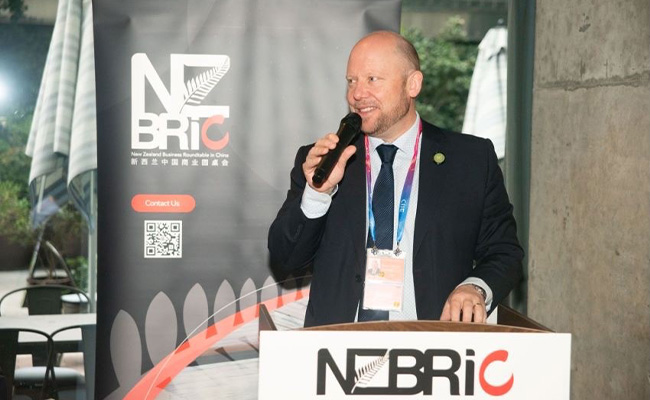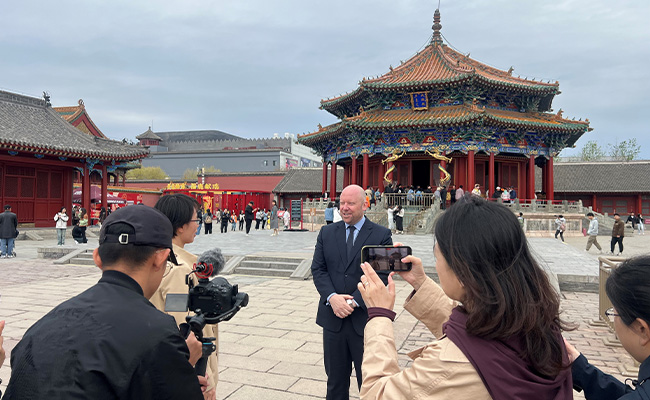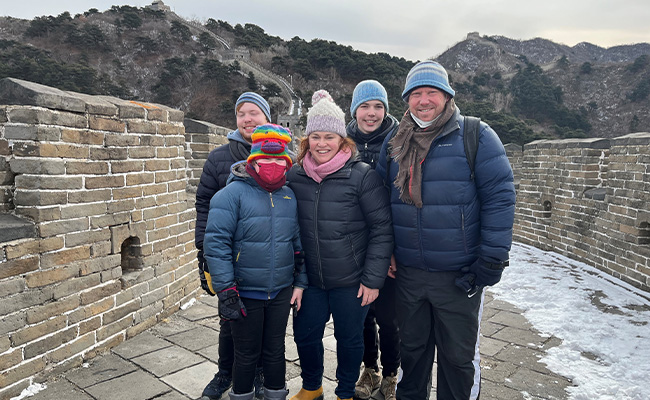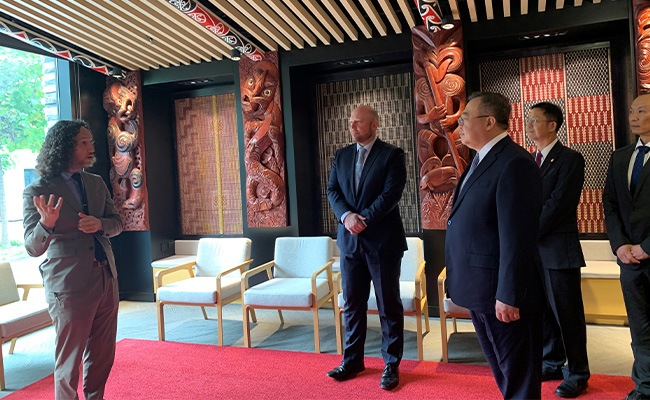@Otago Issue 40
Being curious and engaging with the world
From his first posting in the Cook Islands to his current position as New Zealand Ambassador to China, Otago history alumnus Grahame Morton has remained fascinated by people, ideas and new places.
During his extensive diplomatic career, Grahame has served in several senior roles in the Ministry of Foreign Affairs and Trade, including as High Commissioner to India, Sri Lanka, Bangladesh and Nepal, Principal Advisor on Americas and Asia, and the divisional manager of the North Asia Division. He has also worked on trade, Antarctic, nuclear and Pacific issues, and the Australia, US, Japan and Korea relationships.
Grahame graduated from Otago with a BA (Hons) in History in 1995 and his family connections with the University, and Salmond College in particular, go back many generations.
In this Q&A he talks about how his studies provided the foundation for his career in diplomacy, the rewards and challenges of diplomatic life, and the wide variety of work undertaken as an ambassador.

Ambassador Morton speaking at a New Zealand Business Roundtable in China event in Shanghai, July 2023.
 What drew you to Otago for your university studies?
What drew you to Otago for your university studies?
I grew up in the Bay of Plenty and at that time you had to leave the region to go to any university. My family has several generations of Otago graduates, especially on my mother’s side, so it wasn’t completely unknown.
There were a few things that were attractive about Dunedin. One of my cousins had started at Otago a few years before me and he’d enjoyed his time there, and I wanted a bit of a fresh start. There was the difference from school to university, from rural north to anywhere, but it was an opportunity to go somewhere different and to make my own way.
 Your family and Otago go back a long way?
Your family and Otago go back a long way?
My great-great grandmother Charlotte MacGregor was an early female graduate of Otago University in 1899 – we have had at least one graduate in every generation since. My grandfather was resident at Knox College in the 1930s before studying overseas.
In my first year at Otago, I lived at Salmond Hall [now Salmond College]. We have family connections with Salmond Hall. My mother is a Salmond. Mary Salmond and James (JD) Salmond, whom Salmond College is named after, are my great-aunt and great-uncle respectively. Two of my children are current students at Otago and they stayed at Salmond too.
 How did you make the choice to major in History?
How did you make the choice to major in History?
I started off doing Law and Arts and actually stopped doing Law part way through that degree. I discovered fairly quickly that the part of law that I really loved was the legal history part and so I kept going on that side.
History and English were the subjects I really enjoyed. I joined Professor Erik Olssen’s history honours course in second year and kept going. I loved the inquiry, I loved the discussion, the sessions where you were expected to think, question and respond to critiques.
My History degree has got quite a mixture of New Zealand, Asian and American history papers and a lot of history of ideas. My honour dissertation had a lot on Gold Mining law in it, so perhaps a bit of law stayed with me too. There were interesting special courses, which I took too. I ended up with quite a broad honours degree and apart from History and English, it has some Commerce papers, mainly in Management, as well as my Law papers.

Ambassador Morton conducting media interviews with Chinese media on New Zealand tourism at the Qing dynasty palace in Shenyang, Liaoning province, April 2024.
 Apart from your studies, what else did you enjoy about Otago?
Apart from your studies, what else did you enjoy about Otago?
Outside university I had a marvellous time. I made many friends who remain friends today. I became an early and enthusiastic devotee of the Otago music scene. I spent a lot of time at Sammy’s and the Empire and the Crown with Dunedin bands. Plenty of time huddled for warmth in the corner of student pubs. I also played cricket for University Grange and social rugby and social football. And I enjoyed mountain biking around Dunedin.
Grahame also met his wife Carol in Dunedin. Carol studied Archaeology and has taught Biology, Science and Maths in New Zealand and overseas and more recently worked in a bookshop in Karori in Wellington. Carol and their youngest daughter moved back to Beijing after being in Wellington during the pandemic, after their youngest son started his first year at Otago
 Was a career in the Diplomatic service something you thought about at university?
Was a career in the Diplomatic service something you thought about at university?
Not really at all. Certainly, growing up in the Bay of Plenty I didn’t contemplate a diplomatic career or really a public service career either. We have some people in MFAT (Ministry of Foreign Affairs and Trade) who have always known that’s what they wanted to do but I wasn’t one of those. Most of my work experience was on farms or orchards. But often, your choices are influenced by connections with people and mine is a little like that. A friend of mine had joined Foreign Affairs straight after university, and what he did sounded interesting, so I applied with no real expectations. I was turned down once and then applied again a few years later when I was working elsewhere, was a bit older and better prepared and clearer on what I wanted to do. It wasn’t much more complicated than that.
 How did your History degree help prepare you for working in diplomacy?
How did your History degree help prepare you for working in diplomacy?
I’ve always been interested in other places, in New Zealand’s place in the world. There was a great deal of economic change in New Zealand in the 1980s and, as someone from what was then quite a rural area and from a farm originally, I certainly knew what happened overseas impacted us. In terms of what my university experience taught me, a lot of my papers linked to events that happened offshore over time. And looking back, quite a few of them also had at their core, questions about New Zealand’s place in the world.
A good arts degree demands that you systematically consider different perspectives on ideas. Being able to understand that there are different ways of formulating and presenting your ideas and recognising that people have different perspectives, is essential in diplomacy, where understanding and finding ways to make progress despite different underlying motivations is something we have to do all the time. And learning how to write succinctly with clarity is definitely something that I came out of my honours course far better at than when I started.
 Do those skills and your university experience carry through in your work today?
Do those skills and your university experience carry through in your work today?
Absolutely. I came out of a relatively small high school, so coming into the bigger university was eye opening and good for me. Other students challenge you to think about things in a more robust way. University also encouraged my curiosity which is an underrated but important attribute.
My experience is that New Zealand diplomats have to be interested in people and issues, in exploring ideas, and in working out how best to work in different environments. So adaptability and curiosity about others are important to achieving our interests.
University study at its best adds to people’s confidence and ability to synthesise information and present it well and to be persuasive advocates for the ideas they have. I had great teachers who pushed us to do that.
 During your career you’ve largely specialised in the Asia region, how did this come about?
During your career you’ve largely specialised in the Asia region, how did this come about?
Slightly by circumstance. My first posting was actually in the Pacific. I went to the Cook Islands and ran aid programmes for three years. It wasn’t really where I expected to go but it was in retrospect it was a good fit for me. The work wasn’t office bound, it was practical and project-based, and involved lots of working closely with community and political leaders in the Cooks, which was a real privilege. When I returned to New Zealand, I worked on Antarctic marine issues which is a fascinating part of New Zealand international and domestic science policy.
What got me into doing more in Asia was being posted in Beijing in 2004. I arrived in the aftermath of SARS, during a period of rapid change. We had a very dedicated team in the embassy with excellent leaders in Ambassadors John McKinnon and Tony Browne, from whom I learnt a great deal. There was great energy in the build-up to the 2008 Olympics in Beijing. The Chinese economy was growing very fast and the New Zealand interest in China was growing too. Our first FTA negotiation with China was in full swing. I was in Beijing for nearly four years and that provided a foundation for quite a significant part of my later career.

The Morton family on the Great wall of China at Mutianyu, near Beijing, in minus 15 degrees, January 2023.
 How did you build on that experience, before being appointed Ambassador to Beijing in 2022?
How did you build on that experience, before being appointed Ambassador to Beijing in 2022?
Often the pattern in diplomatic careers is that you develop a range of general skills early on and then over time specialise to a greater degree. I did a range of different roles early in my career and they’ve all contributed in one way or another to what I’ve done later.
After my posting in Beijing, I worked for two years with Australia, learning a lot in the process. I’m glad I had the chance. Australia is a unique relationship for New Zealanders, as it touches so much from Defence to social welfare. I was also fortunate to work with a broad group of New Zealand business leaders to support the Australia New Zealand Leadership Forum.
Working in more senior roles for MFAT in New Zealand [Head of China, Director of North Asia, Principal Adviser on Americas and Asia, and Acting Deputy Secretary] required much more work on resource management and planning, negotiations, developing advice and support for Ministers, engagement with New Zealanders and other stakeholders, and staff development.
My time in India was my first head of Mission appointment as a High Commissioner [from 2014-2017]. That was my first experience of managing a big operation offshore, in an incredibly diverse, developing region of increasing importance to New Zealand. It taught me a lot and was extremely rewarding.
 Can you describe your working day as Ambassador?
Can you describe your working day as Ambassador?
Fundamentally a foreign ministry’s job is to advance the government’s relationship with other governments and to support New Zealanders’ interests in that country. We support ministerial and Prime Ministerial visits and engagement. In Beijing, my NZ Inc team has representatives from nine New Zealand government agencies. We also have Consulates--Generals in Shanghai, Guangzhou, and Hong Kong.
The consular role of embassies offshore is probably best-known. If New Zealanders lose identity documents, suffer severe illnesses or deaths, or are arrested they are likely to have contact with consular staff in New Zealand or offshore. In major emergencies like a cyclone or an earthquake that becomes a significant task involving everyone.
China is obviously a big trade relationship for New Zealand, with nearly $40 billion in two-way trade. I work with NZ Inc. staff from across government to advance our interests in the export of our products and services. I often meet with visiting representatives of New Zealand companies, as do others.
Part of my responsibility is to look at how we communicate essential information about New Zealand in China. We have Chinese social media feeds for conveying practical information about New Zealand. It’s also great when we have the opportunity to work with talented New Zealanders visiting China. Just recently the amazing NZ Secondary Schools Choir put on a concert at the embassy during a tour. We invited key contacts and events like that can help our cultural, education, and business connections.
We work on sustainability too. Climate change is of course a major international issue, and there is continuing work on that between New Zealand and China. Minister Watts recently visited China for a Climate Change meeting. We work with China on migratory birds conservation and national park development which links back to New Zealand through DOC. New Zealand migratory bird species like Kuaka [Godwit] and Red knot migrate annually through the Yellow Sea estuarine areas to Alaska for the northern summer, then all the way back home. We have longstanding links with China local government representatives working to preserve bird habitats. Recently there was good news that several of these sites had been approved for UNESCO World Natural Heritage status. We held a conservation sector event with Chinese partners and the Paulson institute to acknowledge that in August.
Fundamentally what we’re in Beijing to do is to advance New Zealand’s interests through a combination of political, economic, cultural and people to people connections.

Hosting the Head of the International Department of the China Communist party, Li Jianchao, and his team at the New Zealand Embassy, August 2024.
 What attracts you most about working in the diplomatic field?
What attracts you most about working in the diplomatic field?
For me it has always been the sense of possibility that new opportunities offer. And it helps that I like meeting new people. We all want New Zealand to be a more secure, more prosperous, and more engaged place. Good diplomacy defends our interests and makes a difference to the life that is possible for New Zealanders.
 Over time, do you retain the excitement of experiencing life in new places?
Over time, do you retain the excitement of experiencing life in new places?
Moving around is both the privilege and the challenge of life as a diplomat. It gives you the opportunity to see other places for a concentrated period and to get to know people who don’t always share the same opinions, background, or expectations as you do, so there is a constant element of learning and problem solving that goes with that.
You’re always looking at how to develop relationships and make things happen in different environments. So that’s the exciting part, you get the privilege of getting to see some extraordinary things. I’ve pinched myself a few times when I’ve been in New Delhi at the Gandhi memorial, in the US Congress, or China’s Great Hall of the People. But what we learn over time is how to create and use those situations. It’s our responsibility as diplomats to be very well prepared, to be very clear on what it is we’re trying to do. I think our NZ people take that very seriously, as they should.
 And the challenges?
And the challenges?
There are plenty of work challenges and pressures, especially during large events. I was in charge of our on the ground consular response in India after the large 2015 Nepal earthquake, which was a big responsibility. Many MFAT staff were deeply involved in the offshore COVID responses of course. You work with a team, you try and make the best of the situation you are in, but in crisis situations there is a lot of personal responsibility to do the absolute best job you can.
There are particular challenges in diplomacy for families too. My wife’s career has been very disrupted by mine and where we have lived has impacted significantly on what she has been able to do. Children change schools quite often, and have to make and leave behind friends, which isn’t easy. My family has had opportunities to experience things we wouldn’t otherwise have had but it also does ask a lot of family members.
 Do you have any advice for students starting out at university?
Do you have any advice for students starting out at university?
One of the great things about university is that you can find what it is that you are really interested in and are really determined to learn more about. You usually do best at the things you’re really captured by and interested in.
It’s important to look at the kind of skill sets you’re developing. That may be in your course, but it also may be outside it. It may be other things you do. Looking at it as an employer as well, it is really important to know yourself, to work on your ability to communicate, to know how you can get along with people, how you can lead and work with others, and to know the kind of skills you bring to a group.
It’s also important to come out of university knowing that life is about continuing to learn, including different ways of doing things. You will have to adapt and develop your skills throughout a working life and that’s the same across all sectors and jobs, and whether you have an arts education or a technical qualification. There’s a lot of life after university.









